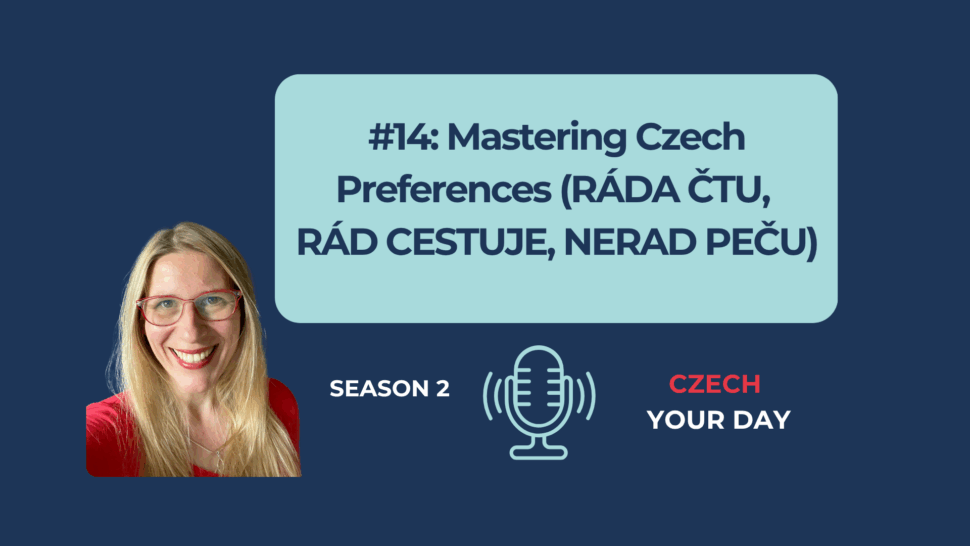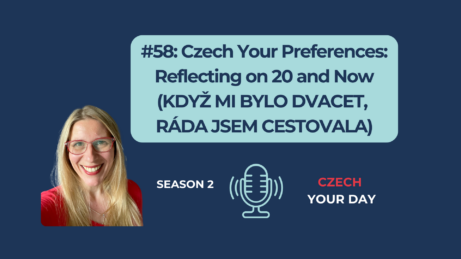Mastering Czech Preferences (RÁDA ČTU, RÁD CESTUJE, NERAD PEČU) (S02/E14 – daily podcast CZECH YOUR DAY)

THIS WEEK’S TOPIC: KONÍČKY/HOBBIES
THE TRANSCRIPT/HANDOUT IS DOWN BELOW
Understanding Preferences in Czech
In today’s blog post, we’re uncovering a new way to say you like something in Czech. You might already be familiar with “MÁM RÁD” or “MÁM RÁDA” for expressing likes (if not, go back to episode #12 – SEASON 2), but today, we’re focusing on the use of „RÁD,“ „RÁDA,“ „NERAD,“ and „NERADA.“
Before diving into the details, it’s important to talk about the difference between textbook Czech and real-life Czech. In this post, we’ll focus on forms commonly used in everyday conversations, not the formal textbook versions. For instance, while „JÁ CESTUJI“ might be perfect for exams, in real life, it would make you sound outdated. I have marked the informal with *.
Practical Examples: Expressing Likes
Pay attention to how these sentences express likes in Czech:
- Co ráda děláš?
- Já ráda cestuju*. Já ráda čtu. Já ráda peču.
(What do you like to do? I like to travel. I like to read. I like to bake.)
Now, let’s see what happens when Tadeáš, a male speaker, talks about his preferences:
- Co rád děláš?
- Já rád cestuju*. Rád čtu.
(What do you like to do? I like to travel. I like to read.)
Notice the change based on whether a male or female is speaking.
Talking About Others’ Preferences
If I talk about my friend Tadeáš, here’s how it sounds:
- Tadeáš rád cestuje. Tadeáš rád peče. Tadeáš rád čte.
(Tadeáš likes to travel. Tadeáš likes to bake. Tadeáš likes to read.)
Grasping the Nuances
If you’re still puzzled, translate it literally. For instance, „JÁ RÁDA ČTU“ literally means „I glad (as a female) I read.“
Similarly, „ON RÁD ČTE“ translates to „he glad he reads.“ These literal translations might help you make more sense.
I’ve prepared sentences where both Renča and Tadeáš express their likes.
- Textbook Czech:
- Já ráda čtu, Tadeáš také rád čte.
(I like to read, Tadeáš also likes to read.) - Já rád čtu, Renča také ráda čte.
(I like to read, Renča also likes to read.) - Informal (real-life Czech):
- Já ráda čtu, Tadeáš taky* rád čte.
(I like to read, Tadeáš also likes to read.) - Já rád čtu, Renča taky* ráda čte.
(I like to read, Renča also likes to read.)
Expressing Dislikes
Now, let’s tackle the more tricky part—expressing what you don’t like:
- Renča:
- Já nerada cestuju*, já nerada peču, já nerada čtu.
(I don’t like to travel, I don’t like to bake, I don’t like to read.) - We are lazy so we usually say: Nerada cestuju*, nerada peču, nerada čtu.
- Tadeáš.
- Já nerad cestuju*, já nerad peču, já nerad čtu.
(I don’t like to travel, I don’t like to bake, I don’t like to read.) - Again preferred version: Nerad cestuju*, nerad peču, nerad čtu.








